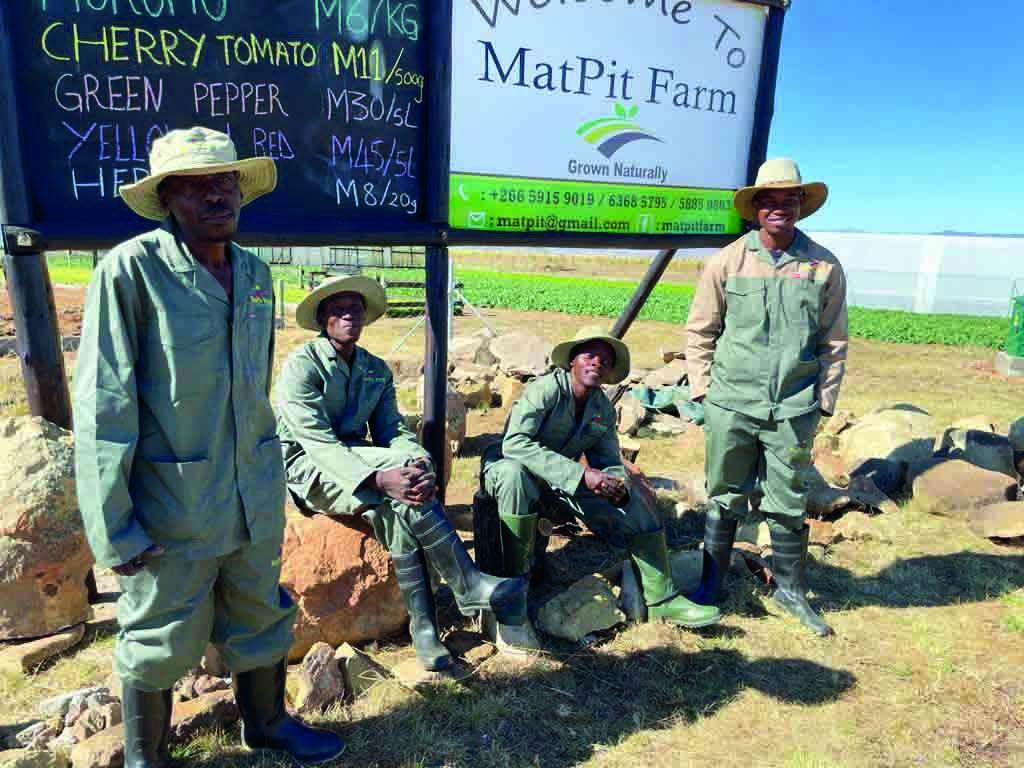Africa-Press – Lesotho. MatPit Farm in Thuathe atop Berea Plateau covers a huge 60 000 square metres. At its peak this year, it was producing 40 boxes of tomatoes a day, 60 packs of green, yellow and red pepper a day, 160 litres of green beans a week.
It has just produced 130 bags of 10kg each and 120 bags of seven kilograms of butternut. And of course there is nearly 4 200 heads of cabbages. This massive farm with a battalion of 12 workers is managed by a young man, Tebatso Rankakalo, a graduate of the Lesotho Agricultural College, which is an affiliate of the National University of Lesotho (NUL).
If you consider the stats above, you won’t be surprised that MatPit Farm has supplied, among others, Enrich Holdings, both of Pick ’n Pay outlets in Maseru, Mahapu Fruits and Veg and Maluti Fruits and Veg.
Many people have already had dinner right from the Berea Plateau. “I never really liked agriculture when I was growing up. In fact, I could say I did not give it too much attention,” he said.
“However, at some point in life, I decided to join the Agric College and, oops! Here I was, learning the secrets of agric.
” Rankakalo said he grew to love agric, the more he learned about it.
When he was done with schooling, something interesting happened. He was asked to be a manager of a very young but ambitious farm. Who would say no to such an opportunity for a young agric graduate?
The farm was just a few months when he joined. Not much had been done. Of course the beans, the spinach and so on had been grown. Some shade-net structures were being erected.
So his job was clear-cut. He had to make sure that the farm was producing food for the people. “That wasn’t easy. ” The soil in that place is, as he put it, “loamy to sandy.
” Whatever that means, we all know that sandy soil is not so good for crops.
“Fortunately, the owners of the farm had already tested it so I knew what I was dealing with.
” So he had to prepare the soil. That was not going to be cheap.
“I had no option but to put as much of the animal manure and fertilizers as possible. That was costly but necessary. ”
You can already imagine the dismay on the faces of his employers as loads and loads of compost was being swallowed by the clearly hungry soil. But the nature of soil is that it doesn’t give unless it takes.
Once the soil was prepared, he started growing the crops, some under shade-nets, some on open land. The sheer size of the crops meant that the already existing borehole was not enough.
But, thankfully, nature intervened. “We immediately got into the rainy season and that was a relief. ” Of course good farmers realise that true agriculture needs water — not necessarily rain.
So plans are underway to provide more boreholes because, who knows what the next growing seasons hold in terms of rain? The farm does not only have crops, there are animals too.
At the moment it has two kinds of chickens, “likhoho tse khoarahla le tsa Sesotho” (Plymouth rock chickens and Sesotho indigenous ones),” he said. There are plans to increase the population of the animals.
They have experimented with all kinds of herbs too. “Man,” they say, “could direct his ways by plain reason, and support his life by tasteless food, but God has given us comedy and flavour, and brightness and laughter and perfumes.
” Rankakalo said they have been testing waters, so to speak, to find out if the local market is ready for all kinds of herbs.
We in Lesotho are yet to accept the important role herbs play especially in enhancing the taste of food—we need more than just salt and fish-oil folks!
“However, we did notice that some herbs are really popular.
” All in all, Rankakalo said he is extremely happy at the farm as he thinks it is on the right path although it is still very young.
“My training in agriculture helps a lot. Combining that with on-the-job learning is great.
” How could he not be happy growing crops and taking care of animals? Quite frankly, that is the only work we know which man was really designed to do.
Anything else is an invention – sitting behind computers all day long is the worst form of such “inventions”. MatPit Farm in Thuathe atop Berea Plateau covers a huge 60 000 square metres.
At its peak this year, it was producing 40 boxes of tomatoes a day, 60 packs of green, yellow and red pepper a day, 160 litres of green beans a week. It has just produced 130 bags of 10kg each and 120 bags of seven kilograms of butternut.
And of course there is nearly 4 200 heads of cabbages. This massive farm with a battalion of 12 workers is managed by a young man, Tebatso Rankakalo, a graduate of the Lesotho Agricultural College, which is an affiliate of the National University of Lesotho (NUL).
If you consider the stats above, you won’t be surprised that MatPit Farm has supplied, among others, Enrich Holdings, both of Pick ’n Pay outlets in Maseru, Mahapu Fruits and Veg and Maluti Fruits and Veg.
Many people have already had dinner right from the Berea Plateau. “I never really liked agriculture when I was growing up. In fact, I could say I did not give it too much attention,” he said.
“However, at some point in life, I decided to join the Agric College and, oops! Here I was, learning the secrets of agric.
” Rankakalo said he grew to love agric, the more he learned about it.
When he was done with schooling, something interesting happened. He was asked to be a manager of a very young but ambitious farm. Who would say no to such an opportunity for a young agric graduate?
The farm was just a few months when he joined. Not much had been done. Of course the beans, the spinach and so on had been grown. Some shade-net structures were being erected.
So his job was clear-cut. He had to make sure that the farm was producing food for the people. “That wasn’t easy. ” The soil in that place is, as he put it, “loamy to sandy.
” Whatever that means, we all know that sandy soil is not so good for crops.
“Fortunately, the owners of the farm had already tested it so I knew what I was dealing with.
” So he had to prepare the soil. That was not going to be cheap.
“I had no option but to put as much of the animal manure and fertilizers as possible. That was costly but necessary. ”
You can already imagine the dismay on the faces of his employers as loads and loads of compost was being swallowed by the clearly hungry soil. But the nature of soil is that it doesn’t give unless it takes.
Once the soil was prepared, he started growing the crops, some under shade-nets, some on open land. The sheer size of the crops meant that the already existing borehole was not enough.
But, thankfully, nature intervened. “We immediately got into the rainy season and that was a relief. ” Of course good farmers realise that true agriculture needs water — not necessarily rain.
So plans are underway to provide more boreholes because, who knows what the next growing seasons hold in terms of rain? The farm does not only have crops, there are animals too.
At the moment it has two kinds of chickens, “likhoho tse khoarahla le tsa Sesotho” (Plymouth rock chickens and Sesotho indigenous ones),” he said. There are plans to increase the population of the animals.
They have experimented with all kinds of herbs too. “Man,” they say, “could direct his ways by plain reason, and support his life by tasteless food, but God has given us comedy and flavour, and brightness and laughter and perfumes.
” Rankakalo said they have been testing waters, so to speak, to find out if the local market is ready for all kinds of herbs.
We in Lesotho are yet to accept the important role herbs play especially in enhancing the taste of food—we need more than just salt and fish-oil folks!
“However, we did notice that some herbs are really popular.
” All in all, Rankakalo said he is extremely happy at the farm as he thinks it is on the right path although it is still very young.
“My training in agriculture helps a lot. Combining that with on-the-job learning is great.
” How could he not be happy growing crops and taking care of animals? Quite frankly, that is the only work we know which man was really designed to do. Anything else is an invention – sitting behind computers all day long is the worst form of such “inventions”.
For More News And Analysis About Lesotho Follow Africa-Press






